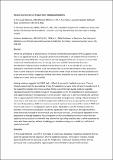Files in this item
Alcohol use disorders in people with intellectual disability
Item metadata
| dc.contributor.author | Williams, Fionnuala | |
| dc.contributor.author | Kouimtsidis, Christos | |
| dc.contributor.author | Baldacchino, Alexander Mario | |
| dc.date.accessioned | 2018-11-30T00:47:04Z | |
| dc.date.available | 2018-11-30T00:47:04Z | |
| dc.date.issued | 2018-07 | |
| dc.identifier | 251796312 | |
| dc.identifier | aad4d116-e73c-4f47-b438-8cb4a97bb91c | |
| dc.identifier | 85058782251 | |
| dc.identifier.citation | Williams , F , Kouimtsidis , C & Baldacchino , A M 2018 , ' Alcohol use disorders in people with intellectual disability ' , BJPsych Advances , vol. 24 , no. 4 , pp. 264-272 . https://doi.org/10.1192/bja.2017.37 | en |
| dc.identifier.issn | 2056-4678 | |
| dc.identifier.uri | https://hdl.handle.net/10023/16584 | |
| dc.description.abstract | This article initially highlights that although the prevalence of alcohol use disorders in people with intellectual disability (PWID) appears to be low, it is a significant issue. This group can be more vulnerable to the adverse effects of alcohol and it is likely that many PWID who have alcohol use disorders are not being identified. We go on to review the limited existing literature on treatment for PWID who have alcohol use disorders and the challenges in meeting the needs of this patient group. We explore how assessment and treatment of alcohol use disorders in this population can be and needs to be tailored to the needs of PWID on an individual basis. There is also discussion about the use of incapacity legislation to treat this group. LEARNING OBJECTIVES Be aware that alcohol use disorders can be especially problematic for PWID, that such disorders can often go undetected and that adapted screening techniques may be needed to identify such problems Understand the difficulties that this population has in accessing addiction services and that successful management of PWID who misuse alcohol is usually dependent on appropriate joint working between intellectual disability and addiction services Be aware that PWID are not a homogeneous group, rather they vary widely in their abilities, necessitating interventions tailored to the individual, and that the use of compulsory measures to manage PWID who lack capacity regarding to their alcohol use should be done with caution | |
| dc.format.extent | 467097 | |
| dc.language.iso | eng | |
| dc.relation.ispartof | BJPsych Advances | en |
| dc.subject | Alcohol | en |
| dc.subject | Learning (intellectual) disabilities | en |
| dc.subject | RC0321 Neuroscience. Biological psychiatry. Neuropsychiatry | en |
| dc.subject | SDG 3 - Good Health and Well-being | en |
| dc.subject.lcc | RC0321 | en |
| dc.title | Alcohol use disorders in people with intellectual disability | en |
| dc.type | Journal item | en |
| dc.contributor.institution | University of St Andrews. School of Medicine | en |
| dc.contributor.institution | University of St Andrews. Population and Behavioural Science Division | en |
| dc.contributor.institution | University of St Andrews. Centre for Minorities Research (CMR) | en |
| dc.identifier.doi | https://doi.org/10.1192/bja.2017.37 | |
| dc.description.status | Peer reviewed | en |
| dc.date.embargoedUntil | 2018-11-30 |
This item appears in the following Collection(s)
Items in the St Andrews Research Repository are protected by copyright, with all rights reserved, unless otherwise indicated.

